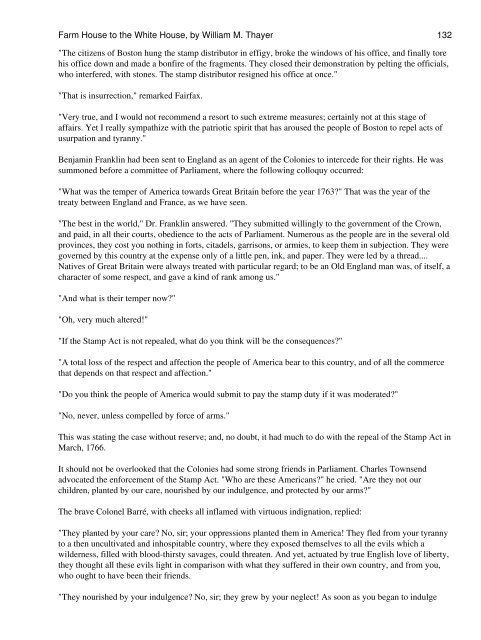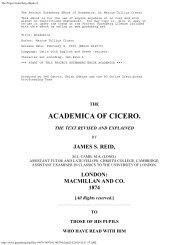From Farm House to the White House - 912 Freedom Library
From Farm House to the White House - 912 Freedom Library
From Farm House to the White House - 912 Freedom Library
You also want an ePaper? Increase the reach of your titles
YUMPU automatically turns print PDFs into web optimized ePapers that Google loves.
<strong>Farm</strong> <strong>House</strong> <strong>to</strong> <strong>the</strong> <strong>White</strong> <strong>House</strong>, by William M. Thayer 132<br />
"The citizens of Bos<strong>to</strong>n hung <strong>the</strong> stamp distribu<strong>to</strong>r in effigy, broke <strong>the</strong> windows of his office, and finally <strong>to</strong>re<br />
his office down and made a bonfire of <strong>the</strong> fragments. They closed <strong>the</strong>ir demonstration by pelting <strong>the</strong> officials,<br />
who interfered, with s<strong>to</strong>nes. The stamp distribu<strong>to</strong>r resigned his office at once."<br />
"That is insurrection," remarked Fairfax.<br />
"Very true, and I would not recommend a resort <strong>to</strong> such extreme measures; certainly not at this stage of<br />
affairs. Yet I really sympathize with <strong>the</strong> patriotic spirit that has aroused <strong>the</strong> people of Bos<strong>to</strong>n <strong>to</strong> repel acts of<br />
usurpation and tyranny."<br />
Benjamin Franklin had been sent <strong>to</strong> England as an agent of <strong>the</strong> Colonies <strong>to</strong> intercede for <strong>the</strong>ir rights. He was<br />
summoned before a committee of Parliament, where <strong>the</strong> following colloquy occurred:<br />
"What was <strong>the</strong> temper of America <strong>to</strong>wards Great Britain before <strong>the</strong> year 1763?" That was <strong>the</strong> year of <strong>the</strong><br />
treaty between England and France, as we have seen.<br />
"The best in <strong>the</strong> world," Dr. Franklin answered. "They submitted willingly <strong>to</strong> <strong>the</strong> government of <strong>the</strong> Crown,<br />
and paid, in all <strong>the</strong>ir courts, obedience <strong>to</strong> <strong>the</strong> acts of Parliament. Numerous as <strong>the</strong> people are in <strong>the</strong> several old<br />
provinces, <strong>the</strong>y cost you nothing in forts, citadels, garrisons, or armies, <strong>to</strong> keep <strong>the</strong>m in subjection. They were<br />
governed by this country at <strong>the</strong> expense only of a little pen, ink, and paper. They were led by a thread....<br />
Natives of Great Britain were always treated with particular regard; <strong>to</strong> be an Old England man was, of itself, a<br />
character of some respect, and gave a kind of rank among us."<br />
"And what is <strong>the</strong>ir temper now?"<br />
"Oh, very much altered!"<br />
"If <strong>the</strong> Stamp Act is not repealed, what do you think will be <strong>the</strong> consequences?"<br />
"A <strong>to</strong>tal loss of <strong>the</strong> respect and affection <strong>the</strong> people of America bear <strong>to</strong> this country, and of all <strong>the</strong> commerce<br />
that depends on that respect and affection."<br />
"Do you think <strong>the</strong> people of America would submit <strong>to</strong> pay <strong>the</strong> stamp duty if it was moderated?"<br />
"No, never, unless compelled by force of arms."<br />
This was stating <strong>the</strong> case without reserve; and, no doubt, it had much <strong>to</strong> do with <strong>the</strong> repeal of <strong>the</strong> Stamp Act in<br />
March, 1766.<br />
It should not be overlooked that <strong>the</strong> Colonies had some strong friends in Parliament. Charles Townsend<br />
advocated <strong>the</strong> enforcement of <strong>the</strong> Stamp Act. "Who are <strong>the</strong>se Americans?" he cried. "Are <strong>the</strong>y not our<br />
children, planted by our care, nourished by our indulgence, and protected by our arms?"<br />
The brave Colonel Barré, with cheeks all inflamed with virtuous indignation, replied:<br />
"They planted by your care? No, sir; your oppressions planted <strong>the</strong>m in America! They fled from your tyranny<br />
<strong>to</strong> a <strong>the</strong>n uncultivated and inhospitable country, where <strong>the</strong>y exposed <strong>the</strong>mselves <strong>to</strong> all <strong>the</strong> evils which a<br />
wilderness, filled with blood-thirsty savages, could threaten. And yet, actuated by true English love of liberty,<br />
<strong>the</strong>y thought all <strong>the</strong>se evils light in comparison with what <strong>the</strong>y suffered in <strong>the</strong>ir own country, and from you,<br />
who ought <strong>to</strong> have been <strong>the</strong>ir friends.<br />
"They nourished by your indulgence? No, sir; <strong>the</strong>y grew by your neglect! As soon as you began <strong>to</strong> indulge















